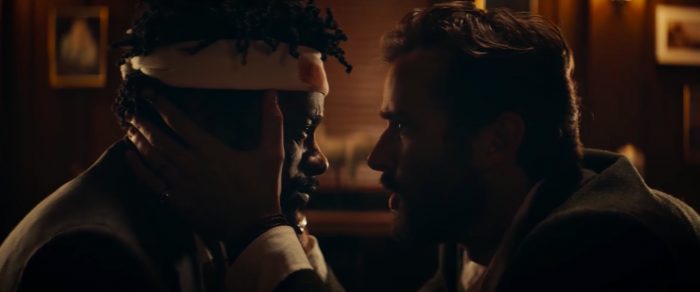
It’s easy to get swept up into the sheer WTF-ness of Sorry to Bother You. A black male telemarketer (Lakeith Stanfield), becomes a white man over the phone in order accelerate his professional success, subsequently gets swallowed up into the system, and tries to fight the power only after he becomes the mutant creature “the man” has always seen him as. It’s a lot to wrap your head around. But for many black people, this metaphorically captures the struggles that so many face on a day-to-day basis in Corporate America.
(The rest of this post contains spoilers for Sorry to Bother You.)
It’s a conundrum that doesn’t really have any easy answers. How do you navigate a predominantly white space as a black person? More pointedly, how do you succeed and dominate a space that was not designed for your advancement? There’s a certain level of assimilation that people of color often feel compelled to embody when they enter white Corporate America. Much of it comes down to the impossibly eager-to-please demeanor, the strained I-hate-this-place-but-I-need-this-paycheck smile, and pretending to enjoy engaging with their employees about white minutiae. It’s the job within the job, and after a while black employees can start to take comfort in the sheer ridiculousness — particularly as their performance of whiteness catapults them up the corporate ladder.
That’s just what happens to Cassius, a fairly “woke” black man trying to maneuver his increasingly gentrified Oakland, California neighborhood. Financial struggles and the threat of being forced out of his own city finds him on a desperate search for income — which he earns from a job at RegalView, selling meaningless things to white people over the phone. But it is not until he gets sage advice from his coworker to don a serene, confident “white voice” in order to make more sales and essentially keep his job. He doesn’t just keep his job, though – he surpasses all of his colleagues — including friends Sal (Jermaine Fowler) and Squeeze (Steven Yeun), and his girlfriend Detroit (Tessa Thompson) — and leaves them all on the ground floor as he rises up to the “Power Caller” penthouse floor.
Writer/director Boots Riley probably could have directed Stanfield to put on the white voice that so many black people already inherently know how to do so well. After all, code-switching is the single most basic form of survival in the black community. But instead he cast an actual white voiceover actor — David Cross — who adds a surreal layer to an already too-crazy-to-be-true story. Because it is crazy, but it’s also grounded in something very real.
Once he arrives at the top level, things get even more disturbing for Cassius on two levels: 1) he discovers that RegalView is working with WorryFree, a company known to exploit labor with the allure of eventual freedom from bills, and 2) he complies anyway. Up here he has to don the white voice 100% of the time and pretend to be entertained by all the random ridiculousness that comes out of his colleagues’ mouths. But, for all intents and purposes, he has made it. He’s got a fat paycheck that allows him to move up and out of his neighborhood and pay off his uncle’s mortgage. His white voice is hilarious to him now. He even does it when he’s hanging out with his friends — much to their disgust. But it means he’s also become a sellout, particularly to Detroit, Sal, and Squeeze, who are in the middle of staging a picket to fight against their minimum wage salaries and the general mistreatment of RegalView employees. While they’re trying to rail against the system, though, Cassius is completely enveloped by it.

It’s a question that has plagued many black workers: can you be woke and successful in white Corporate America? It’s the same one Cassius must confront. Who doesn’t want to be free from the burden of having to worry about bills? That has been the barometer of success for many Americans, so why should he apologize for it? But that’s what’s so interesting about Sorry to Bother You; it shows how seductive capitalism is — so much so that you’re willing to sacrifice your own values, personality, and wokeness to achieve it. That is most profoundly portrayed in the cringeworthy party scene after Cassius meets WorryFree CEO Steve Lift (Armie Hammer). On one hand, he’s doing so well that he’s hanging out with the big guns in their own habitat — an almost hallucinatory gathering (much to the credit of cinematographer Doug Emmett) that embodies all kinds of excess including drugs and naked women. But even at this pinnacle career moment for him, he’s brought down to size when Steve asks him to perform in front of his white guests, sans his white voice. This is the moment where he has to perform blackness for the crowd, often a rite of passage for seemingly assimilated black workers whose relationships with their colleagues have graduated from the office to the bar where everyone’s guards are let down. But what does that black look like? What is it these people are actually looking for? For Cassius, it ends up being a nonsensical rap song he makes up with only the N-word repeated throughout it. They love it.
Cassius probably could have chosen to flee the scene once the crazy reached this all-time high. But enamored by Steve and his friends’ acceptance, instead he chooses to follow Steve upstairs to his suite, where he was congratulated and given a mystery substance to snort. It is only after this point, when he encounters mutants in the bathroom, that he realizes that he’s been a black pawn for Steve and his mission this whole time. WorryFree has been turning black laborers into hybrid creatures, and Steve wants Cassius to become one for only five years in order to keep the rest in line — for a cool $100 million. Again, this may sound wild and you may go, “Come on now, Riley, MUTANTS?!” But if you think about how so many black and other disenfranchised workers have been sidelined and reduced to merely trained robots, whose talents have been taken advantage of, it’s not so outlandish.
The final gut punch in Sorry to Bother You is what actually seals Riley’s overall thesis. After Cassius flees the party scene, finds his wokeness again among his friends, and tries in vain to blow WorryFree’s cover and shut its mission down, it only ends up all backfiring in his face. The public doesn’t care about WorryFree’s problematic mission and Cassius has fully metamorphosed into what Steve refers to as a “equisapien.” Riley underscores, in his own bizarre way, that this is metaphorically what can happen when a black man gets to a certain level in his career and challenges his white superior — he gets burned. Or in this case, turned into a made-up creature with no real power. Cassius in his new form still tries to rebel, but it’s likely too late. Which would mean “the man” has won again despite all effort. Go figure.
The post ‘Sorry to Bother You’ is More Than a “WTF” Experience – It’s a Reflection of Chilling Reality appeared first on /Film.
from /Film https://ift.tt/2NYVnDQ
